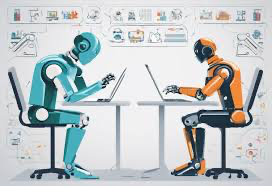The game-changing release of ChatGPT has everyone talking about — and worried about — how generative AI will change the way we work. With every new technology, there are disruptions to the job market, but something feels different about ChatGPT and similar programs like Google Bard and Microsoft Bing AI.
Generative AI is a new type of artificial intelligence (AI) that uses algorithms to generate original text, images, software code, Excel formulas and even music from a simple text prompt. Generative AI applications like ChatGPT have been “trained” on massive amounts of data and can produce human-quality content in seconds.
So, the question is: Will your job be replaced by AI?
AI’s Impact on the Job Market
According to a 2023 report from Goldman Sachs, the labor markets in both the United States and Europe could “face significant disruption” if generative AI lives up to the hype. As much as a quarter of current jobs could be fully replaced by AI, and two-thirds of all jobs — or 300 million jobs — will be impacted by AI automation in ways both large and small.
The good news is that changes in the job market move slowly, says Tom Davenport, a professor of IT and management at Babson College in Massachusetts and author of several best-selling books on AI in the workplace, including “All in on AI: How Smart Companies Win Big with Artificial Intelligence.”
“In general, these AI tools will eat away at the margins of jobs, automating certain tasks,” says Davenport. “And even if those tasks are taken over completely, there’s still a need for a human in the loop.”
That’s not to say that some jobs won’t disappear entirely and maybe faster than you think, says Martin Ford, futurist and author of “Rule of the Robots: How Artificial Intelligence Will Transform Everything.”
“Here’s a question to ask yourself: Do you have the kind of job where another person could study a record of everything you’ve done and figure out how to do your job?” asks Martin. “If the answer is yes, then your job will be susceptible.”
8 Jobs Most Threatened by AI
For all of the hype around generative AI, there are many jobs that are very difficult, if not impossible to automate.
- Skilled Tradespeople
Think about all of the knowledge, dexterity and problem-solving skills required to be a certified plumber or electrician. Sure, there are routine jobs, but every situation brings unique and unexpected challenges, both physical and mental.
Generative AI is impressive, and so are warehouse and factory robots, but to replicate the unique skills of a human plumber or electrician “would require C3PO from ‘Star Wars,'” says Ford. “To build a robot that could do that kind of job is science fiction.”
- Construction
In the near future, much of the work that goes into designing and engineering buildings will be done with the help of AI software, but when it comes to hammering nails and laying bricks, the construction industry still needs plenty of old-fashioned muscle and human know-how.
More and more construction will be done on a modular basis, meaning that individual components will be produced in factories by 3D printers and other machines off-site, and then assembled on-site. But according to a report by McKinsey, only 15 to 20 percent of new construction will be modular by 2030.
“For those activities that do remain on-site, it’s unlikely that a company will fire a carpenter and bring in the latest robot to do everything the carpenter did. Rather, machines will take over individual activities within a role. What that means is workers will need to learn to work side by side — or in a hybrid role — with machines,” the report added.
- Food Preparation and Serving
According to the Goldman Sachs report (Exhibit 8), at least half of the job tasks involved in cooking and serving food simply cannot be done by AI or robots. Compare that to the legal sector, where the report says that 40 percent of tasks can be fully replaced with AI and 60 percent can be at least complemented by machines.
That’s not to say that automation won’t make inroads into the food industry. The fast food chain White Castle already uses robots in some locations to flip burgers and cook fries. As with other services, Davenport believes that people are willing to sacrifice on the low-end. “We don’t care if a robot makes our hamburger at White Castle,” he says, “but if you go out to a really nice restaurant, you don’t want the chef to be a robot.”
- Psychology and Counseling
Once again, there are plenty of AI applications being designed for the counseling and mental health space — conversational AI chatbots are expected to be a $1.25 billion market by 2025.
But Ford says that while chatbot applications like Woebot can do basic mental health counseling — and can even guide users through exercises like cognitive behavioral therapy — they won’t replace human therapists, nor are they designed to.
“For the foreseeable future, we’re not going to see machines that have the kind of human interactions and relationship building skills that people have,” says Ford.
Other health care jobs with deep human interaction, like nurses and doctors, are likely to remain un-replaced by AI.
- Elementary School Teachers
Education is also being transformed by technology. Both Davenport and Ford point to exciting innovations like online learning and AI-powered tutoring apps that customize learning to the individual student. But again, there are inherent limitations to what an AI can do in the classroom, especially for teaching young children.
“At the preschool and elementary school level, there’s a strong need for that human level of interaction,” says Ford. “Once the students get older, though, it becomes less important.” (Some would disagree, citing the role teachers play in continuing to inspire and guide students of all ages.)
Still, Ford sees a day when AI instructors in high school and college are “outpacing what human teachers can do.”
- Professional Athletes and Coaches
Will NBA fans be cheering on a robot Lebron James anytime soon? Not likely. The physical and mental prowess of professional athletes will be nearly impossible to replicate in a machine.
That’s not to say that athletes and coaches aren’t already benefiting from AI. There are applications that track each player’s precise movements and make recommendations for improving performance and reducing injuries.
Moving forward, coaches will tap AI to identify the best recruits, analyze an opponent’s defensive strategy and make targeted training recommendations for individual players. But like teachers and therapists, there’s no replacement for the human factor of a good coach.
- Drivers (For Now)
This might come as a surprise, since there’s been so much hype about driverless cars. Aren’t we just a few years away from self-driving Ubers and 18-wheelers putting all human cabbies and truck drivers out of business?
Both Davenport and Ford say no.
Sure, Waymo already offers driverless rides in a select area of downtown Phoenix, Arizona, with plans to expand to San Francisco and Los Angeles, but this technology is “still far away from being pervasive,” says Davenport, who has been hearing about the imminent takeover of driverless vehicles since the 1980s. “The general feeling seems to be, we’re 90 percent of the way there, but the last 10 percent will take a while.”
Ford agrees, citing the unpredictability of real-world driving and the liability it places on driverless car companies.
“Once you’re out on a public road with pedestrians and bicyclists and dogs and cats, it’s chaos,” says Ford. “There’s no way to control that. That’s been the challenge for self-driving cars on public roads.”
- Truly Creative Thinkers
Entrepreneurs, inventors, authors and actors — those kinds of jobs will undoubtedly use generative AI as a tool, but ChatGPT by definition cannot “think outside of the box.” Ford says that “genuinely creative jobs” are the safest ones to have in the age of AI.
Even if AI encroaches upon writing and art and music, Davenport believes that people will always be willing to pay a premium for “human-generated activity,” especially at the high end.
So, while AI can generate business earnings reports or election results, analysis of what it all means, or giving it a point of view, requires a human writer — at least for now.










